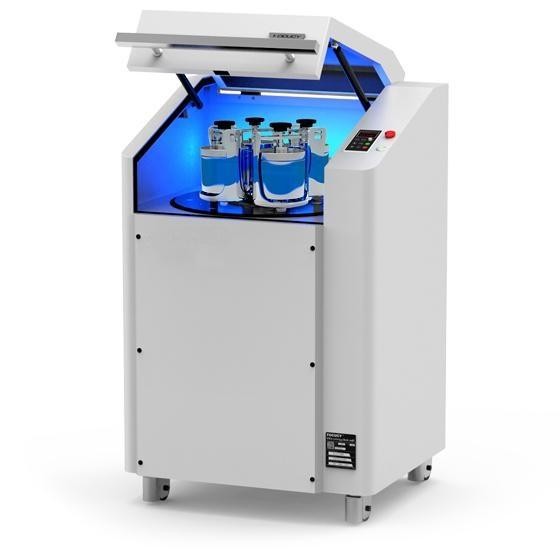
Milling Equipment
Laboratory Planetary Ball Mill Cabinet Planetary Ball Milling Machine
Item Number : KT-CPBM
Price varies based on specs and customizations
- Maximum injection size
- < 20 mm
- Sample particle size range
- 0.1-20um
- Maximum processing volume
- 2000ml
- Maximum speed of the ball mill
- 1200 r/min
Shipping:
Contact us to get shipping details Enjoy On-time Dispatch Guarantee.
Why Choose Us
Easy ordering process, quality products, and dedicated support for your business success.
lntroduction
The vertical cabinet structure combined with ergonomic design enables users to obtain the best comfortable experience in standing operation. The maximum processing capacity is 2000ml, and the speed is 1200 revolutions per minute. The cabinet planetary ball mill has stronger crushing capacity and higher grinding efficiency, and can obtain more accurate sample results more quickly.
It also uses frequency conversion control system to realize various functions such as speed control, positive and negative alternate, intermittent and continuous modes. It is equipped with open PC windows and LED lighting, supports 220V and 380V two driving voltages, and supports inert gas protection grinding. , can be equipped with liquid nitrogen cryogenic protection grinding, temperature monitoring and touch control.
Principle
The planetary ball mill operates by subjecting grinding jars to eccentric rotation on a sun wheel, creating opposite movements and Coriolis forces. This dynamic interplay of frictional and impact forces releases high energy, enabling efficient size reduction and the production of nano powders.
Applications
Planetary ball mills are versatile tools used in various scientific and industrial applications for the grinding and processing of materials down to ultrafine and nano-sized particles. These mills are particularly favored in laboratory settings due to their ability to produce high-energy impacts and friction between grinding balls and the material, leading to efficient size reduction and mechanical alloying. Key applications of planetary ball mills include:
- Material Synthesis: Used for synthesizing new materials through mechanical alloying, which involves the combination of different metals or compounds to create alloys with unique properties.
- Powder Production: Effective for producing fine powders from various materials, including ceramics, metals, and polymers, which are essential for additive manufacturing and other industrial processes.
- Chemical Reactions: Enhances solid-state chemical reactivity by facilitating intimate mixing and creating defects in crystal structures, which can promote or alter chemical reactions.
- Nano-material Development: Ideal for the production of nano powders, with sizes ranging from 2 to 20 nm, crucial for developing advanced materials with enhanced properties.
- Research and Development: Widely used in academic and industrial research for the development of new materials and for studying the effects of mechanical processing on material properties.
- Pharmaceutical and Cosmetic Industries: Used for grinding and dispersing active ingredients in pharmaceutical and cosmetic products to ensure uniform distribution and efficacy.
- Environmental Applications: Can be used for the stabilization of hazardous materials by reducing their particle size and altering their chemical reactivity, aiding in environmental remediation.
- Energy Storage: Useful in the development of materials for energy storage applications, such as the production of powders for batteries and capacitors.
These applications highlight the critical role of planetary ball mills in advancing material science and contributing to the development of innovative products across multiple industries.
Features
Planetary ball mills are essential tools in laboratory settings, designed to grind sample materials down to very small sizes, often in the nano-scale. These machines utilize a unique mechanism where the grinding jars and sun wheel rotate in opposite directions, creating a complex interplay of forces that result in high-energy milling. This process is not only efficient but also versatile, capable of producing uniform fine powders suitable for various applications in materials science and nanotechnology. Here are the key features that make planetary ball mills stand out in routine laboratory work:
- Special Gear Design for Low Noise and Vibration: This feature ensures a quieter and smoother operation, enhancing the comfort and efficiency of laboratory work.
- LCD Control Panel: Provides precise control over the milling process, allowing for adjustments in speed and duration to suit different material requirements.
- Safety Mechanism: Ensures the safe operation of the mill, protecting both the user and the equipment from potential hazards during the grinding process.
- Stable Rotation Speed: Maintains consistent milling performance, which is crucial for achieving uniform particle sizes and high-quality end products.
- Reliable Heavy-Duty Design: Built to withstand the rigors of frequent use, ensuring durability and longevity of the equipment.
- Programmable Milling Segment: Offers flexibility in setting specific milling parameters, enabling the customization of the grinding process to meet specific research needs.
- Customized Power Supply: Available in 110V, 220V, or 380V, accommodating different power requirements and ensuring compatibility with various laboratory setups worldwide.
These features collectively enhance the functionality and efficiency of planetary ball mills, making them indispensable in laboratories for the synthesis of nano-sized materials and the development of innovative products.
Functions
- Continuous and intermittent operation
- Emergency stop
- Timing
- Power failure memory
- Overload and hazardous operation protection
- LED Lighting
- Heat Dissipation
- Universal Wheel
Advantages
Planetary ball mills offer a range of advantages that make them indispensable in laboratory settings for the grinding of sample materials to extremely fine sizes. Here are some of the key benefits:
- High Grinding Efficiency: Planetary ball mills are designed to achieve rapid grinding of materials, making them ideal for processing materials with high hardness and viscosity. The grinding efficiency is notably high, and the fineness of the product can reach sub-micron levels, which is crucial for applications requiring nano-sized particles.
- Versatility in Applications: These mills are suitable for grinding a wide variety of materials, including magnetic materials, inorganic non-metallic materials, organic chemical materials, and biomedical materials. This versatility makes them a valuable tool in multiple scientific and industrial research areas.
- High Precision and Control: The grinding process in planetary ball mills is highly precise, allowing for fine control over the particle size distribution. This precision is essential for achieving consistent results in material synthesis and research.
- Advanced Mechanism for Enhanced Energy Transfer: The unique design of planetary ball mills, where the rotation directions of the bowl and turn disc are opposite, results in a synchronized alternation of centrifugal forces. This mechanism leads to friction and impact forces that are much higher than those in conventional ball mills, enhancing the energy transfer during the grinding process.
- Compact and User-Friendly Design: Planetary ball mills are smaller in size compared to traditional ball mills, making them more suitable for laboratory environments where space is often limited. They are also designed with user convenience in mind, featuring simple maintenance requirements and ease of operation.
- Production of Nano Powders: These mills are capable of producing nano powders ranging from 2 to 20 nm in size, depending on the speed of rotation of the balls. This capability is crucial for research and development in nanotechnology and materials science.
- Cost-Effectiveness: Despite their advanced capabilities, planetary ball mills are relatively inexpensive and easy to operate, providing a cost-effective solution for laboratories looking to achieve high-quality grinding results.
- 8. Generation of Crystal Defects: The mechanical energy applied during the milling process can induce crystal defects, which can be beneficial for certain applications such as altering the properties of materials or initiating specific chemical reactions.
These advantages collectively highlight the effectiveness and utility of planetary ball mills in laboratory settings, particularly for tasks requiring the fine grinding of materials and the synthesis of nano-sized particles.
Technical specifications
| Grinding principle | Impact & friction force |
| Suitable materials | Small and medium-low hardness; brittle; dry or wet |
| Materials input size | < 20 mm |
| Materials output size | 0.1-20 um |
| Processing volume | 2000ml |
| Disc panspeed | 1`200 r/min |
| Grinding panmaterial | Tungsten carbide;Ceramic; Agate; Stainless steel; Harden steel; Nylon, etc. |
| Planetary disk space movement mode | X axis planetary movement |
| Motor power | 220V/380V AC ,50-60Hz,1500W |
| Net weight | 326kg |
| Dimensions | L780*W700*H1220 mm |
| Protection level | IP65 |
| Quality standards | CE |
Warnings
Operator safety is the top important issue! Please operate the equipment with cautions. Working with inflammable& explosive or toxic gases is very dangerous, operators must take all necessary precautions before starting the equipment. Working with positive pressure inside the reactors or chambers is dangerous, operator must fellow the safety procedures strictly. Extra caution must also be taken when operating with air-reactive materials, especially under vacuum. A leak can draw air into the apparatus and cause a violent reaction to occur.
Designed for You
KinTek provide deep custom made service and equipment to worldwide customers, our specialized teamwork and rich experienced engineers are capable to undertake the custom tailoring hardware and software equipment requirements, and help our customer to build up the exclusive and personalized equipment and solution!
Would you please drop your ideas to us, our engineers are ready for you now!
Trusted by Industry Leaders

FAQ
What Is A Planetary Ball Mill?
What Is A Laboratory Ball Mill?
What Is A Planetary Ball Mill And How Does It Differ From Common Ball Mills?
What Are The Main Applications Of Planetary Ball Mills?
What Are The Applications Of A Laboratory Ball Mill?
What Is Milling Equipment Used For?
What Are The Key Features Of Planetary Ball Mills?
What Are The Main Types Of Laboratory Ball Mills?
What Are The Different Types Of Milling Equipment?
What Are The Advantages Of Using A Planetary Ball Mill?
What Is The Working Principle Of A Laboratory Ball Mill?
What Materials Can Be Processed Using Milling Equipment?
What Types Of Planetary Ball Mills Are Available?
What Are The Advantages Of Using A Laboratory Ball Mill?
How Does Milling Equipment Work?
How Does The Automatic Reversal Mechanism In Planetary Ball Mills Work?
What Materials Can Be Processed Using A Laboratory Ball Mill?
What Are The Advantages Of Using Milling Equipment?
What Makes Planetary Ball Mills Suitable For Small Particle Samples?
What Are The Key Features Of A High-energy Planetary Ball Mill?
What Factors Should Be Considered When Selecting Milling Equipment?
What Is The Difference Between A Planetary Ball Mill And A Vibratory Ball Mill?
4.8 / 5
This planetary ball mill is a game-changer! It's so easy to use and gives consistent results. Highly recommended!
4.7 / 5
Amazing machine! It's powerful, efficient, and very user-friendly. Definitely worth the investment.
4.9 / 5
This ball mill is top-notch! The build quality is excellent, and it performs flawlessly. I'm very impressed.
4.6 / 5
I'm really happy with this purchase. It's a great value for the price and has made my research work so much easier.
4.8 / 5
This is an excellent product. It's well-made, easy to use, and produces high-quality results. I highly recommend it.
4.9 / 5
I'm thoroughly impressed with this ball mill. It's powerful, efficient, and very easy to operate. Highly recommended!
4.7 / 5
This planetary ball mill is a great addition to my lab. It's a powerful and reliable machine that produces consistent results.
4.8 / 5
I'm very happy with this purchase. The ball mill is well-made, easy to use, and produces high-quality results.
4.9 / 5
This is an excellent product. It's well-made, easy to use, and produces high-quality results. I highly recommend it.
REQUEST A QUOTE
Our professional team will reply to you within one business day. Please feel free to contact us!
Related Products

High Energy Planetary Ball Mill Milling Machine for Laboratory
The biggest feature is that the high energy planetary ball mill can not only perform fast and effective grinding, but also has good crushing ability

Laboratory Planetary Ball Mill Rotating Ball Milling Machine
KT-P400E is a desktop multi-directional planetary ball mill with unique grinding and mixing capabilities. It offers continuous and intermittent operation, timing, and overload protection, making it ideal for various applications.
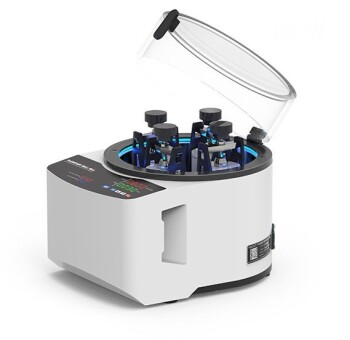
Mini Planetary Ball Mill Machine for Laboratory Milling
Discover the KT-P400 desktop planetary ball mill, ideal for grinding and mixing small samples in the lab. Enjoy stable performance, long service life, and practicality. Functions include timing and overload protection.

High-Energy Omnidirectional Planetary Ball Mill Machine for Laboratory
The KT-P2000E is a new product derived from the vertical high-energy planetary ball mill with a 360°rotation function. The product not only has the characteristics of the vertical high-energy ball mill, but also has a unique 360°rotation function for the planetary body.

High-Energy Omnidirectional Planetary Ball Mill Milling Machine for Laboratory
The KT-P4000E is a new product derived from the vertical high-energy planetary ball mill with a 360° swivel function. Experience faster, uniform, and smaller sample output results with 4 ≤1000ml ball mill jars.

High Energy Planetary Ball Mill Milling Machine for Laboratory
Experience fast and effective sample processing with the F-P2000 high-energy planetary ball mill. This versatile equipment offers precise control and excellent grinding capabilities. Perfect for laboratories, it features multiple grinding bowls for simultaneous testing and high output. Achieve optimal results with its ergonomic design, compact structure, and advanced features. Ideal for a wide range of materials, it ensures consistent particle size reduction and low maintenance.

Laboratory Horizontal Planetary Ball Mill Milling Machine
Improve sample uniformity with our Horizontal Planetary Ball Mills. KT-P400H reduces sample deposition and KT-P400E has multi-directional capabilities. Safe, convenient and efficient with overload protection.
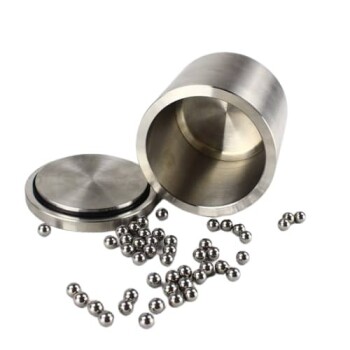
Laboratory Ball Mill Jar Mill with Metal Alloy Grinding Jar and Balls
Grind and mill with ease using metal alloy grinding jars with balls. Choose from 304/316L stainless steel or tungsten carbide and optional liner materials. Compatible with various mills and features optional functions.
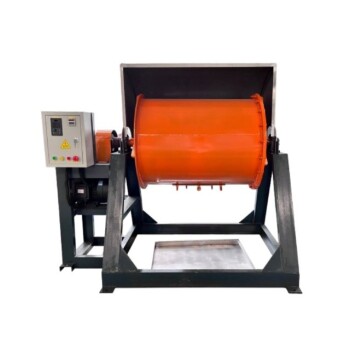
Stainless Steel Laboratory Ball Mill for Dry Powder and Liquid with Ceramic Polyurethane Lining
Discover the versatile stainless steel dry powder/liquid horizontal ball mill with ceramic/polyurethane lining. Ideal for ceramic, chemical, metallurgical, and building materials industries. High grinding efficiency and uniform particle size.

Laboratory Ten-Body Horizontal Jar Mill for Lab Use
The Ten-body horizontal jar mill is for 10 ball mill pots (3000ml or less). It has frequency conversion control, rubber roller movement, and PE protective cover.

Laboratory Jar Ball Mill with Alumina Zirconia Grinding Jar and Balls
Grind to perfection with alumina/zirconia grinding jars and balls. Available in volume sizes from 50ml to 2500ml, compatible with various mills.
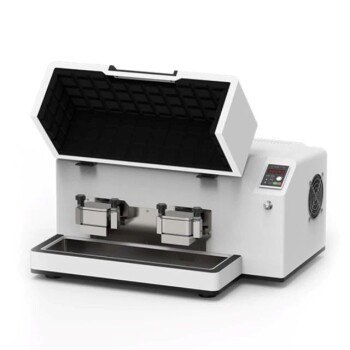
High Energy Vibratory Ball Mill for Lab Use
The high-energy vibrating ball mill is a high-energy oscillating and impacting multifunctional laboratory ball mill. The table-top type is easy to operate, small in size, comfortable and safe.

Laboratory Four-Body Horizontal Jar Mill
The four-body horizontal tank mill ball mill can be used with four horizontal ball mill tanks with a volume of 3000ml. It is mostly used for mixing and grinding laboratory samples.

Lab Vibration Mill
Vibration Mill for Efficient Sample Preparation, Suitable for Crushing and Grinding a Variety of Materials with Analytical Precision. Supports Dry / Wet / Cryogenic Grinding and Vacuum/Inert Gas Protection.
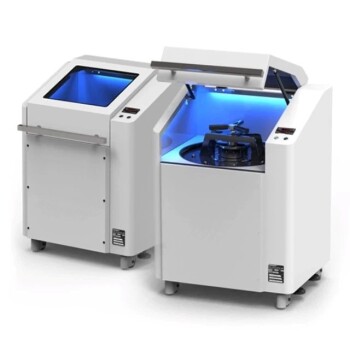
Laboratory Disc Cup Vibratory Mill for Sample Grinding
The vibrating disc mill is suitable for non-destructive crushing and fine grinding of samples with large particle sizes, and can quickly prepare samples with analytical fineness and purity.

Laboratory Micro Tissue Grinding Mill Grinder
KT-MT10 is a miniature ball mill with a compact structure design. The width and depth are only 15X21 cm, and the total weight is only 8 kg. It can be used with a minimum 0.2ml centrifuge tube or a maximum 15ml ball mill jar.

Laboratory Test Sieves and Vibratory Sieve Shaker Machine
Efficiently process powders, granules, and small blocks with a high-frequency vibration sieve. Control vibration frequency, screen continuously or intermittently, and achieve accurate particle size determination, separation, and classification.

Automatic Heated Hydraulic Press Machine with Heated Plates for Laboratory Hot Press 25T 30T 50T
Efficiently prepare your samples with our Automatic Heated Lab Press. With a pressure range up to 50T and precise control, it's perfect for various industries.
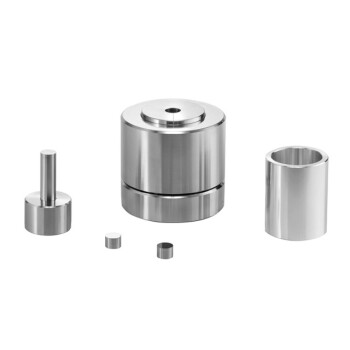
Assemble Lab Cylindrical Press Mold
Get reliable and precise molding with Assemble Lab Cylindrical Press Mold. Perfect for ultra-fine powder or delicate samples, widely used in material research and development.
Related Articles

Advantages of Planetary Ball Mill in Laboratory Applications
Discover the advantages of using planetary ball mills in laboratory settings. Learn about its ability to produce fine powder, suitability for toxic materials, wide range of applications, continuous operation, and usage for milling abrasive materials. Explore how planetary ball mills differ from traditional milling machines and their function in creating ultrafine and nano-sized materials.

Planetary Ball Mills: Research Tools for Efficient Mixing and Nanoscale Grinding
Planetary ball mills are indispensable tools in modern laboratories, serving a crucial role in the mixing, fine grinding, and preparation of small samples. These mills are particularly adept at dispersing nanomaterials and facilitating the development and small-scale production of high-tech materials.

Maximizing Grinding Efficiency: The Power of Planetary Ball Mills
Discover why planetary ball mills offer higher grinding efficiency than ordinary ball mills. Learn about the technology behind their high-performance all-round capabilities. Find out the key factors influencing the productivity and specific energy consumption of ball mills.

Disc / Cup Vibratory Mill: A Comprehensive Guide to Grinding Equipment
Discover the world of Disc / Cup Vibratory Mills! This guide covers everything from types and features to applications and benefits. Explore the versatility of these mills for grinding various materials in industries like pharmaceuticals, food, and chemicals.

Disc / Cup Vibratory Mill: A Comprehensive Guide to Its Functions and Applications
Discover the world of Disc / Cup Vibratory Mills with our in-depth guide. Learn about their working principles, applications, advantages, and key features. Explore the various types of vibratory mills and their suitability for different industries.

Disc / Cup Vibratory Mill: A Comprehensive Guide for Laboratory Experts
Discover the world of Disc / Cup Vibratory Mills! This comprehensive guide provides an in-depth understanding of their types, working principles, advantages, and applications in various industries, including pharmaceuticals, chemicals, and food processing.

Features of Different Laboratory Mills: An Overview
Laboratory mills are specialized machines used to reduce non-homogenous batch samples into smaller, representative samples that are more uniform in composition.

Laboratory Crushers: A Comprehensive Guide to Their Uses and Functionality
Laboratory crushers play a crucial role in scientific research and analysis. These crushers, commonly known as jaw crushers, are indispensable in obtaining accurate and consistent results for sample preparation.

What is a Laboratory Crusher Used For?
Discover the uses and working mechanism of laboratory crushers. Explore various types of crushing equipment and their applications. Learn how laboratory crushers play a crucial role in scientific analysis and environmental studies.

Choosing the Best Material for Ball Mill: Essential Factors and Recommendations
Discover the best material for ball mill applications and grinding success. Learn about the features and benefits of stainless steel, ceramic, agate, and tungsten carbide media. Find out how to ensure grinding success and the ideal grinding jars and media for planetary ball milling. Explore the applications of ball mills and the advantages of high-energy ball mills for ultra-fine particles.

Understanding the Tablet Press Machine R&D Lab Model and its Features(2)
The Tablet Press Machine R&D Model, also known as a single punch tablet press, is designed for the development and small batch production of tablets. It is widely used in industries such as pharmacy, chemical, food, and metallurgy. This machine operates automatically, continuously filling, pressing, and ejecting tablets. Its key features include high precision filling, low noise, low material consumption, and smooth operation. It is particularly useful for research and development in laboratories, hospitals, and plants, catering to small-scale production needs.

Benchtop KBr Pellet Press: A Comprehensive Overview
If you're looking for a way to compress powdered materials into uniform pellets without contamination, then the KBr Pellet Press might just be the perfect solution for you. Whether you're working in a pharmaceutical, biological, nutrition, or spectrographic lab, this hand-operated press offers convenience and efficiency in a small package.